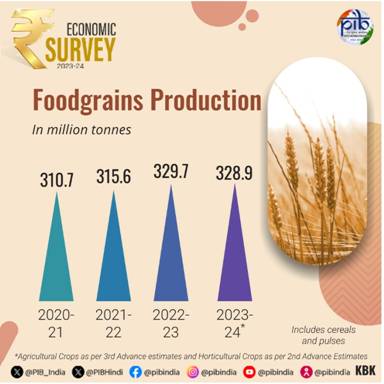New Delhi: The Economic Survey 2023-24 was presented today in the Parliament by Union Finance and Corporate Affairs Minister Smt. Nirmala Sitharaman, highlighting the pivotal role of the agriculture sector in India’s economy and the need for strategic investments to sustain growth and innovation.
The Survey emphasizes the need for smallholder farmers to transition to high-value agriculture, which is crucial for increasing their incomes. This shift is expected to create a ripple effect, driving demand for manufactured goods and spurring a manufacturing revolution in the country.
Agriculture continues to be a cornerstone of the Indian economy, providing livelihood support to 42.3% of the population and contributing 18.2% to the nation’s GDP at current prices. The sector has shown resilience with an average annual growth rate of 4.18% over the last five years. However, the growth rate for 2023-24 stood at a modest 1.4%, attributed to various challenges including adverse weather conditions.
Investment in agricultural research has been instrumental in enhancing food security. The Economic Survey reveals that every rupee invested in agricultural research yields a payoff of ₹13.85. In 2022-23, the government allocated ₹19,650 crore for agricultural research, highlighting the commitment to advancing the sector through innovation.
Private Sector Investment and Technological Advancements
The Survey calls for increased private sector investment in agriculture, emphasizing the need for advancements in technology, production methods, marketing infrastructure, and reduction of post-harvest losses. Enhancing post-harvest infrastructure and developing the food processing sector are seen as key to reducing wastage and ensuring better prices for farmers.
India achieved record foodgrain production of 329.7 million tonnes in 2022-23, with oilseed production reaching 41.4 million tonnes. However, 2023-24 saw a slight decline in foodgrain production to 328.8 million tonnes, mainly due to poor and delayed monsoons. The domestic availability of edible oil has also increased significantly, reducing dependence on imports despite rising domestic demand.
To improve agricultural marketing efficiency, the government has successfully implemented the e-NAM scheme, with over 1.77 crore farmers and 2.56 lakh traders registered as of March 2024. Additionally, the initiative to form and promote 10,000 Farmer Producer Organizations (FPOs) by 2027-28 is well underway, with 8,195 FPOs already registered and significant financial support provided to ensure their growth.
The Economic Survey reiterates the government’s commitment to ensuring remunerative returns for farmers through the MSP scheme, which has been providing a margin of at least 50% over the average cost of production since 2018-19. Social security for farmers is also addressed through the Pradhan Mantri Kisan Maandhan Yojna (PMKMY), offering a monthly pension of ₹3,000 to enrolled farmers upon reaching 60 years of age.
The Survey underscores the importance of sustainable farming practices, highlighting the PM-PRANAM initiative aimed at reducing the use of chemical fertilizers and promoting alternatives like Nano Urea, Nano DAP, and organic fertilizers.
The Pradhan Mantri Fasal Bima Yojana (PMFBY) continues to provide a crucial safety net for farmers against crop losses due to natural calamities, pests, or diseases. The scheme, the largest of its kind globally, insured 610 lakh hectares in 2023-24 and has paid out claims amounting to ₹150,589.10 crore since its inception.





